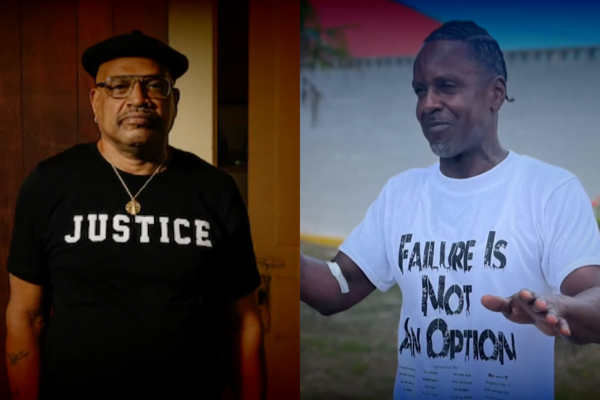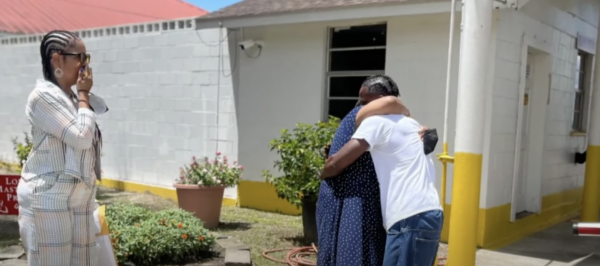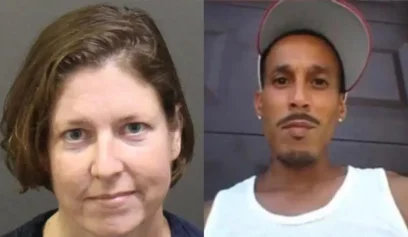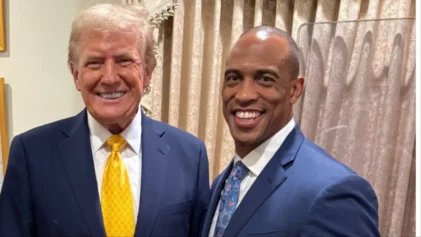A Louisiana man is now free from prison after spending nearly 25 years incarcerated for a crime he says he did not commit.
A judge on Aug. 8 granted Cedric Dent’s request to vacant his conviction. Local prosecutors also announced that they would no longer pursue the charges.

Dent, 43, was found guilty of the 1997 shooting death of Anthony Milton in New Orleans. But Innocence Project New Orleans found that Dent had an alibi that his defense lawyer did not use, and the prosecutor held back evidence that could have acquitted him. It echoes an ordeal his mother’s brother dealt with 20 years before.
“Cedric Dent is a victim of the failures of every system that was put in place to protect his rights as a person accused of a crime — a police department that did the bare minimum to investigate a serious crime; lawyers that didn’t have the resources or the wherewithal to investigate his case; and a district attorney’s office that concealed evidence that should have been turned over and would have helped Mr. Dent get the not guilty verdict he deserved at trial,” said Meredith Angelson, one of Dent’s lawyers, said in a statement.
Milton was shot after an argument inside a New Orleans supermarket with the alleged assailant, reports show. The gunman fired into the back of Milton’s head as he walked through a dark area in the St. Thomas Housing Projects with his cousin Jerry Hamilton.
The Innocence Project investigators said the lead detective heard a rumor that Dent was the shooter and included his photograph in a picture lineup for Hamilton. Milton’s cousin was the only witness who identified Dent as the suspect.
However, the Innocence Project found that state lawyers hid documents that showed Hamilton’s original description of the suspect did not match Dent, and another witness who saw the shooter’s description also differed from Dent’s appearance.
Investigators said Dent also has visible gold teeth that Hamilton did not mention, and his version of the events changed numerous times. In addition, Dent was at a movie theater 16 miles away watching “Hoodlum,” investigators said, but his public defender did not mention that in the murder trial.
“I was a working man. I was just taking care of my family then all of a sudden things went wrong,” Dent said. “They just took my life away from me.”

Dent was also found guilty by a non-unanimous jury –– two of the jurors thought he was innocent. The verdict is no longer accepted in Louisiana.
“After a thorough review of Mr. Dent’s case, our office concluded that — like many convictions decided by non-unanimous jury — his guilty verdict stemmed from a trial that was unfair precisely because one of the twelve jurors had voted to acquit and because of constitutionally ineffective assistance from his defense attorney,” New Orleans Parish District Attorney Jason Williams said in a statement.
Dent’s case is not an anomaly in New Orleans. Innocence Project New Orleans has helped 41 people get their convictions overturned since launching in 2001. One of them is Dent’s uncle, Elvis Brooks.
Brooks served more than 42 years in prison after being wrongfully arrested in 1977. He was accused of being involved in a robbery at a bar in the Lower Ninth Ward that left one patron dead. Brooks’ conviction was based on white eyewitnesses who identified him in a photo lineup. Twelve alibi witnesses testified that Brooks was at home when the robbery took place.
Innocence Project investigators found that the state knew that fingerprints from beer bottles touched by the suspects did not belong to Brooks. Police also knew that Black eyewitnesses did not identify Brooks as one of the robbers. Studies have shown that racial bias can increase the likelihood of false identification, a phenomenon referred to as the cross-race effect.
Brooks was freed in October 2019 at 62 years old.
“The fact that two members of the same family were wrongfully convicted may sound like an extraordinary coincidence, but in fact it shows just how commonplace these horrific miscarriages of justice are in our criminal legal system,” Jee Park, Innocence Project New Orleans executive director, said.
“Mr. Brooks received the same unfair and dehumanizing treatment in 1977 that Mr. Dent did in 1997. The causes of wrongful convictions in our community are spread vast and rooted deep — today as they have always been.”


